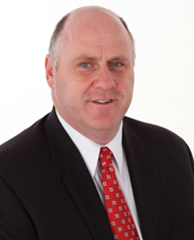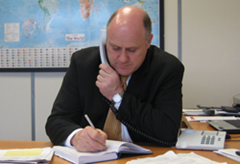Political Platform: Noel Grealish TD
 First elected a TD in 2002, Noel Grealish was a Progressive Democrat until the party disbanded in 2009, but now serves Galway West as an independent. He tells eolas about the party’s time in power and shares his views on why people have lost confidence in the political system.
First elected a TD in 2002, Noel Grealish was a Progressive Democrat until the party disbanded in 2009, but now serves Galway West as an independent. He tells eolas about the party’s time in power and shares his views on why people have lost confidence in the political system.
How and why did you become involved in politics?
I got involved through my dad who was a staunch Fianna Fáiler, who dragged me screaming to my first Fianna Fáil meeting at 15 years of age. He was President of the local cumann, and from that I got involved. I developed a very good friendship with Bobby Molloy. I was there on the night Bobby left Fianna Fáil to join the Progressive Democrats in February 1986, in Leisureland, Galway. I joined too.
I won’t tell you what my dad said when I went home, but a shoe was thrown at me and a few expletives used about me.
At the time the country was crying out for something they could grab on to, to give them hope or confidence. I felt that Dessie O’Malley, Mary Harney and Bobby Molloy were a great combination to try and come up with solutions. That’s part of the reason that I joined the Progressive Democrats, the other being the relationship I had with Bobby Molloy.
I ran in the 1999 local elections in the Oranmore electoral area and was elected. Then in 2002, I was leaving the house on a Friday morning and David Hanley on Morning Ireland came on the radio at five minutes to eight and said: “We’ve got a note here from Minister Molloy, who’s resigned as a junior Minister and will not be contesting the next general election.” I knew the phone call would come.
Bobby rang at about 11 o’clock and said: “You’re running.” I think I got one of the lowest first preference votes in the country that time and I still got elected because I got transfers from all over.
What do you think is the Progressive Democrats’ legacy on Irish society and public life?
The Progressive Democrats were formed in a climate that we’re actually in now, where the people felt that they were being burdened too much. The party believed low taxes generated more employment. If you look at the stamp duty rate at the time, I think it was 40 per cent and brought in about €70 million a year. They cut it to 20 per cent; it brought in something like €600-700 million in the first year. It got people spending. People can argue that that’s what caused the building crisis which we have now because it got people selling and buying houses, but the Progressive Democrats at the time worked on job creation.
We were an economic party, I believed. We lost our sense of direction when we went into the two toughest departments: justice and health.
The Progressive Democrats did the groundwork to get multi-nationals into Ireland, created the current climate for them, and brought in the low taxation that gave them the opportunity to create thousands of jobs.
What’s unique about Galway West?
Galway is the gateway to the west; it’s a beautiful county. It’s a tribal, young, attractive city. You’ve 20,000 students coming to Galway every year. It has a university which is a huge asset to our city. The university does a lot of joint ventures with the multi-nationals. It has the Galway-Mayo Institute of Technology, and has a huge area to draw upon for workers, from Donegal down to Kerry.
You’ve also the beauty of Connemara. I love it there: the scenery, the people, just the peace and quiet, that when you get out there you can just pull up and read a paper and eat a sandwich. On a rainy, frosty, snowy or sunny day, it’s beautiful.
 Does Irish political culture need to change and if so, how?
Does Irish political culture need to change and if so, how?
We have a government with such a large majority that it causes its own problems. If Jack Lynch was alive he’d tell you that. In 1977, he came in with the largest majority Fianna Fáil ever had yet he was gone in a couple of years. It is depressing at times coming into the Dáil to see what’s happening at leaders’ questions and what’s been said. I don’t think the Dáil is used to its potential.
If there was a lot more co-operation between all political parties, if some mechanism or system could be set up to try and get us out of this, the people would have a lot more confidence in the political system. They’ve lost all confidence in it.
Fine Gael, I felt, made an awful lot of promises coming up to the last general election that they did not need to make. If they’d made one promise, that they’d work to get back our financial sovereignty, the people would have backed them on that and would have voted in the hundreds of thousands that did vote for them. All that they promised is coming back now, biting at their heels.
What do you hope to achieve for your constituency and your country during the 31st Dáil?
I’d like to continue on working for the most deprived and most vulnerable in our society. We come across terribly sad cases of families or individuals under stress or struggling, families with disabled children that might be finding it very tough to survive. I’d like to continue to work with them.
I work with government ministers, with whom I’ve a good working relationship, to try and bring whatever industry I can to Galway and on any issues regarding schools, hospitals, for the betterment of my constituency.
Nationally, one thing I’d like to achieve is to work on an all-party committee if one was set up on budgetary issues, to try and find savings or cost-cutting measures that wouldn’t affect the most vulnerable.
How do you like to relax?
I find it very hard to relax. What I like is the odd game of golf and I’ve been skiing, for 15 years now, I think. It’s the one trip I absolutely love. I always go either in early January or February. Same place, same hotel, same resort: in Kitzsbühel, Austria. When I get on the plane to come home,
I look forward to going out again the next year. That keeps me going for the year.





